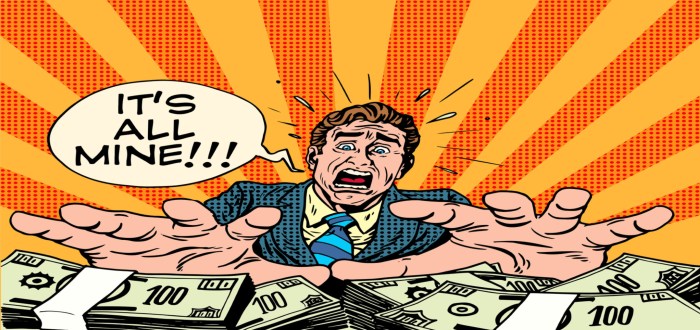Examples of greed in the crucible – In Arthur Miller’s “The Crucible,” greed manifests itself in various forms, driving characters to commit heinous acts. This essay will explore the examples of greed exhibited by Abigail Williams, Thomas Putnam, Reverend Parris, and the townspeople of Salem, highlighting their motivations, consequences, and the play’s broader themes.
Abigail Williams’ False Accusations

Abigail Williams’ desire for John Proctor fuels her false accusations against innocent individuals in Arthur Miller’s “The Crucible.” Her greed for power and control drives her to manipulate the witch trials to eliminate her rivals and secure Proctor’s affections.
Examples of Abigail’s Greed
- Abigail falsely accuses Elizabeth Proctor of witchcraft, motivated by jealousy and a desire to remove her rival.
- She targets Mary Warren, who initially resists her accusations, to consolidate her authority within the group of accusers.
- Abigail’s accusations escalate to include prominent citizens, such as Giles Corey and Rebecca Nurse, as she seeks to expand her influence and silence dissent.
Consequences of Abigail’s Actions
- Her accusations create a climate of fear and paranoia, leading to the imprisonment and execution of innocent people.
- Abigail’s greed undermines the trust and unity of the community, fostering suspicion and division.
- Her actions ultimately backfire as the community turns against her, recognizing her manipulation and self-serving motives.
Thomas Putnam’s Land Grabbing: Examples Of Greed In The Crucible

Thomas Putnam’s ambition to expand his land holdings at the expense of others is a driving force behind his involvement in the witch trials in “The Crucible.” His greed and cunning lead him to use his influence to acquire land through questionable means.
Instances of Putnam’s Land Grabbing
- Putnam targets landowners accused of witchcraft, such as Rebecca Nurse, to seize their property.
- He uses his position as a town official to manipulate land records and legal proceedings to his advantage.
- Putnam’s greed extends to his own family, as he disinherits his daughter, Ruth, to prevent her from claiming her rightful inheritance.
Impact on Salem
- Putnam’s land-grabbing schemes disrupt the social and economic fabric of Salem, creating resentment and inequality.
- His actions undermine the rule of law and erode trust within the community.
- Putnam’s greed ultimately contributes to the downfall of the witch trials as the townspeople realize the extent of his manipulation.
Reverend Parris’ Materialistic Motives
Reverend Parris’ desire for wealth and status influences his actions throughout “The Crucible.” He exploits his position as the town’s religious leader for personal gain, contributing to the hysteria and injustice of the witch trials.
Examples of Parris’ Greed, Examples of greed in the crucible
- Parris initially encourages the witch hunt to protect his reputation and maintain his authority within the community.
- He accepts payment from Abigail Williams’ uncle to support her accusations, suggesting his willingness to profit from the trials.
- Parris’s materialistic motives are evident in his lavish lifestyle and his attempts to secure a more prestigious position in another town.
Consequences of Parris’ Actions
- Parris’s greed undermines his credibility as a religious leader, leading to a loss of respect and trust from the community.
- His actions contribute to the spread of fear and paranoia, as he encourages the accusations against innocent individuals.
- Parris’s materialistic motives ultimately lead to his downfall as the community recognizes his hypocrisy and self-serving nature.
The Townspeople’s Fear and Hysteria
The witch trials in “The Crucible” are fueled by a pervasive atmosphere of fear and paranoia that grips the town of Salem. Greed and self-interest contribute to the spread of mass hysteria, leading to acts of violence and injustice.
Causes of Fear and Hysteria
- Religious extremism and the belief in the supernatural create a fertile ground for fear and superstition.
- Economic and social tensions within the community contribute to a sense of insecurity and distrust.
- Abigail Williams and other accusers manipulate the situation to settle personal grudges and gain power.
Consequences of Fear and Hysteria
- The townspeople become increasingly suspicious of one another, leading to a breakdown in trust and community cohesion.
- Fear drives them to commit acts of violence and injustice, as they seek to protect themselves from perceived threats.
- The mass hysteria ultimately undermines the rule of law and destroys the lives of innocent individuals.
Essential FAQs
How does Abigail Williams’ greed for power manifest in the play?
Abigail’s desire for John Proctor motivates her false accusations against innocent individuals, as she seeks to eliminate obstacles to their relationship.
What are the consequences of Thomas Putnam’s land-grabbing schemes?
Putnam’s greed leads to social and economic unrest in Salem, as he uses his influence to acquire land through questionable means, displacing others and disrupting the community.
How does Reverend Parris’ materialism influence his actions?
Parris’ desire for wealth and status leads him to exploit his position as the town’s religious leader for personal gain, manipulating the witch trials to consolidate his power.
What role does fear play in the spread of greed in Salem?
Fear and paranoia grip the town, creating an atmosphere where greed and self-interest flourish. The townspeople’s fear of witchcraft leads them to commit acts of violence and injustice, as they seek to protect themselves and their own interests.